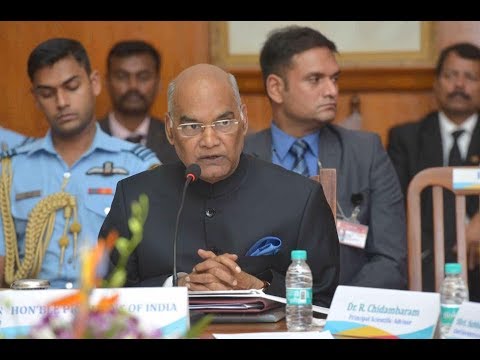
The President of India, Shri Ram Nath Kovind, visited the laboratory and the Centre for Nano Science and Engineering (CeNSE) at the Indian Institute of Science (IISc), Bengaluru, today (October 24, 2017).
Later, the President participated in a roundtable discussion with scientists at IISc, Bengaluru. Addressing the scientist community, the President said that Knowledge, Discovery and Innovation are three of the four wheels that take a country forward. The fourth is our Society. Each wheel must move in co-ordination, in pace and in the right direction. The slightest misstep by one will take us in the wrong direction or stall us. Scientists have an immense responsibility. They are directly in charge of three wheels. But unless they connect every day with the fourth, society, we have no future.
The President said that India faces enormous challenges. We are to lift our people out of poverty, ensure their health and well-being and ensure our food and energy security. Society rightly demands solutions to these problems. On the other hand, scientists must not compromise their quest for knowledge – from atoms to galaxies. And these two endeavours are not contradictory.
The President said that we have seen how ISRO has succeeded through the efforts of the late Dr Satish Dhawan in combining cutting-edge science with helping farmers. And in linking ISRO’s research, applications and innovation with the academic capacities of IISc. The challenge is to replicate that partnership and that synergy, across institutions and across disciplines.
The President said that today scientists have the opportunity to pioneer a revolution where all the scientific institutes in Bengaluru work together. They can share their strengths and show by example how science and technology can take us to new heights. The spark from their efforts in Bengaluru can light the flame of knowledge all over the country. It can help take the culture of innovation further and deeper – from lab to shop floor, right down to school classrooms.
Leading scientists from Bengaluru presented a flavour of their plans for a paradigm shift in the way their efforts have become more collaborative and thereby more effective. In addition to IISc, scientists from JNCASR, inStem, NCBS, the Raman Institute and the Indian Institute of Astrophysics were present. The speakers pointed out that India has shown leadership in astronomy and mega- physics as well as materials research. In bio-technology too, our research is at global levels. The science leaders said that there is a sense of shared purpose and collaboration to take on new challenges and help achieve the goals of New India 2022.
Those present at the roundtable discussion included Dr R. Chidambaram, Principal Scientific Adviser to the Government of India; Professor Anurag Kumar Director, IISc; Dr K. Vijay Raghavan, Secretary, Department of Biotechnology; Dr Ashutosh Sharma, Secretary, Department of Science and Technology; Shri K.K. Sharma, Secretary, Higher Education, Ministry of Human Resource Development; Shri Kiran Kumar, Chairman, ISRO; Dr S. Christopher, Chairman, DRDO and other scientists who spoke in the discussions and made presentations before the President.
